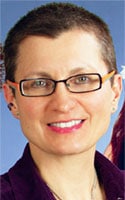As you age, don’t settle for declining energy
By Barbara Pierce

Just because you’re getting older doesn’t mean you need to feel older. Far too many older folks simply accept loss of energy as part of the aging process.
Loss of energy, feeling weary and experiencing that tiredness that doesn’t go away even when you rest — you don’t have to resign yourself to this as part of normal aging.
Fatigue and weakness are not to-be-expected consequences of growing older.
Many people have the perception that aging equals decline. That’s just wrong, say the experts. Of course, peoples’ bodies do change as they get on in years. But it is a gradual process.
One common thing that causes lack of energy is a declining level of Vitamin D in our blood as we age, said Heidi S. Puc, founder and physician owner of Integrative Medicine of Central New York (IM of CNY), Chittenango. IM of CNY specializes in integrative adult medicine, healing-oriented medicine that bridges conventional and natural medicine.
Vitamin D is vital to boosting our energy. When your skin is exposed to sunlight, it makes vitamin D.
“In this area, we’re further away from the equator, so we have lower levels of intense sunlight,” explained Puc. “And, as we age, our skin doesn’t as effectively use sunlight to produce Vitamin D.”
Another important cause of loss of energy is inactivity. “When we’re inactive, our aging muscles get weak, which causes further loss,” said Puc.
You’ve seen the TV commercial that says: “A body at rest will remain at rest; a body in motion will remain in motion.” A wise and true statement made by physicist Isaac Newton many years ago.
In other words, if you spend most of your days sitting around doing little physical activity, your body will adapt to that sedentary lifestyle. Your energy level will deteriorate.
Probably the most important thing we can do to prevent declining energy is ensuring that we remain physically active and don’t become sedentary.
“To avoid the cycle of decline, it is important to continue to be physically active,” recommended Puc. “Do any enjoyable activity, like gardening or walking, so that it becomes a regular part of your life.”
Choose activities you find interesting. You are more likely to keep up with an activity routine if it’s fun rather than a chore. Consider walking in the morning sunlight and getting a dose of Vitamin D. Purchase a Vitamin D level test kit online to conveniently check your Vitamin D levels at home.
“It takes energy to make energy,” is another wise saying. If you use energy being active, your body will adapt by making the energy you need for your activities. You’ll have more energy — just like you did when you were younger.
Slipping into isolation
Don’t underestimate the impact of declining energy; chronically weary older adults are at risk of becoming socially isolated. They feel like they just don’t have enough energy to shower, get dressed and drive to their friends, their club, church, senior center or wherever. They gradually get out of the house less and less frequently. Social isolation leads to many related health problems, like depression, cognitive decline, and heart disease.
Declining energy impacts the likelihood of continuing to live independently. If one’s mental and physical abilities decline enough, continuing to live independently may be impossible.
And, of course, when one becomes inactive, muscles become weaker and weaker. Falls are the leading cause of both fatal and nonfatal injuries among older adults, as well as the leading reason for a move to assisted living. Having good balance can help prevent falls; balance depends on strength in one’s muscles.
Restoring strength and energy cannot be done on an on and off basis. You have to be active every day if you are over 50, because the older you are, the more quickly your new-found vigor will atrophy if not constantly reinforced, and the slower it will return once you begin to be active once more.
There are many overlooked and lesser-known causes of loss of energy. Some health issues, like anemia, dehydration, hypercalcemia, and thyroid disorder might be playing a role in your fatigue.
Some medications and some medical treatments can drain energy. Emotional issues that one may not even be aware of, like depression, excessive worrying, or grief, can cause fatigue. Also, sleep challenges and some foods, especially fried foods or sweets, can cause loss of energy.
A sudden change in your level of energy could be significant and a sign of a stroke.
If you are concerned about your declining energy, discuss this with your health care provider. The earlier you identify and deal with these problems, the better.
For more information on Puc and IM of CNY, visit https://www.imofcny.com or call 315-741-5774.

